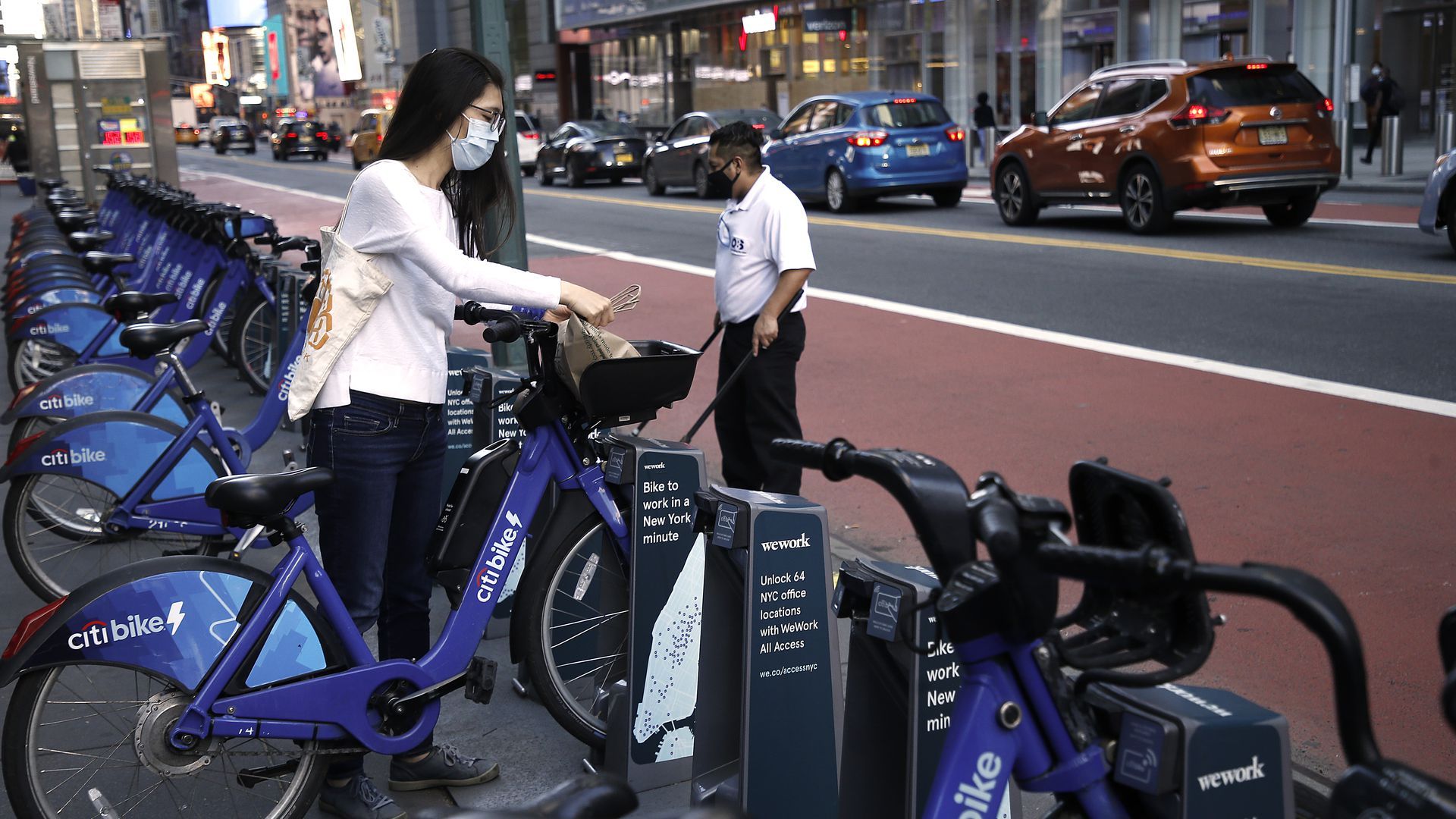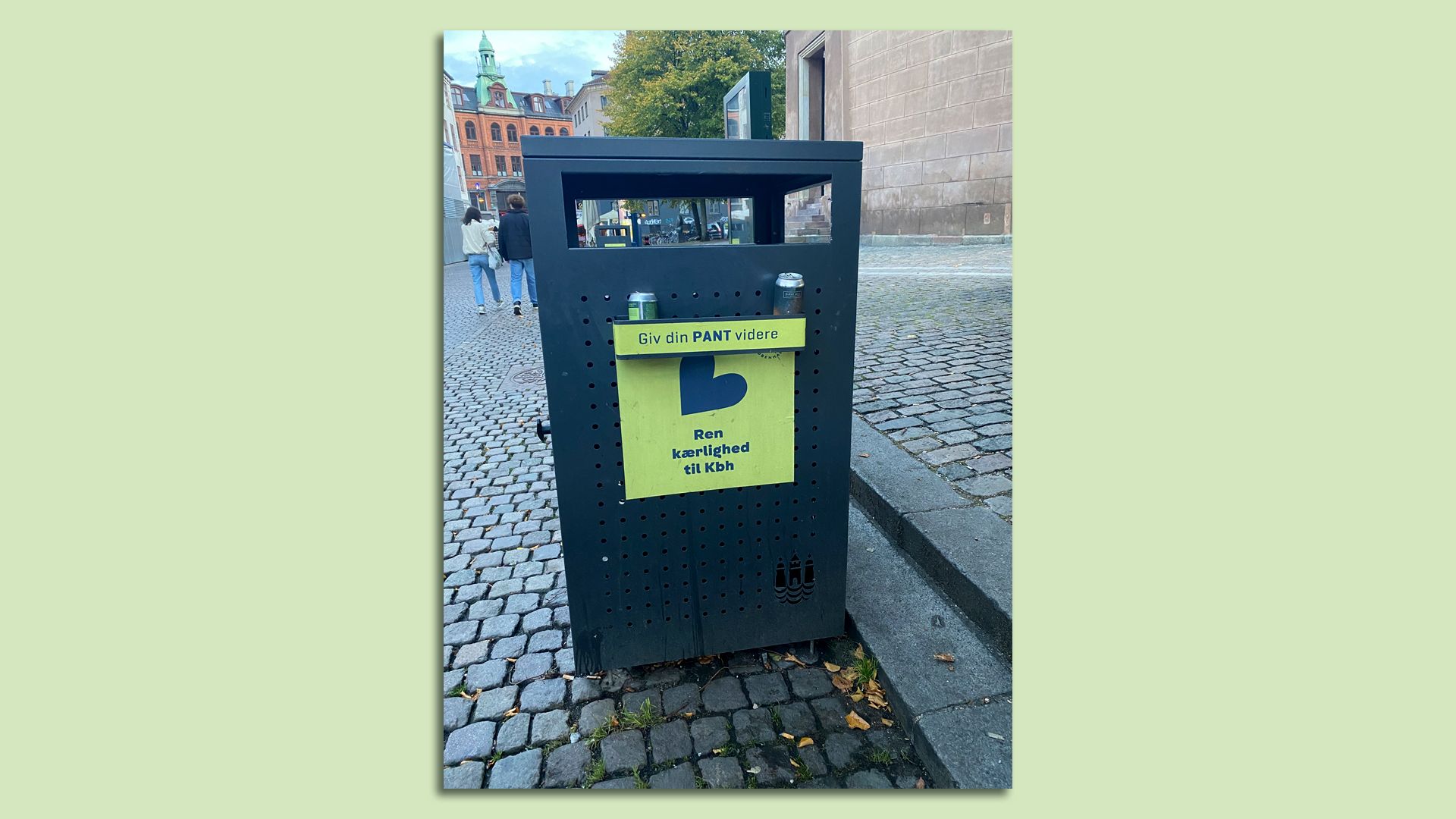| | | | | | | Presented By General Motors | | | | Axios What's Next | | By Jennifer A. Kingson, Joann Muller and Erica Pandey ·Oct 06, 2021 | | Welcome back! Today we learn that the Rent Is Too Damn High, which was also the slogan of a beloved-but-fringey NYC politician, Jimmy McMillan, who ran for mayor periodically. - Our daily photo comes from Copenhagen, where Axios' Erica Pandey describes a neat facet of Danish recycling that we don't have here.
- Please use Erica as inspiration! Send us a photo you took that encapsulates how we live, work, play, or get around: whatsnext@axios.com.
And: Please join What's Next's Joann Muller today at 12:30pm ET for a virtual event on the future of autonomous vehicles. Guests include Rep. Cathy McMorris Rodgers (R-Wash.) and John Deere chief technology officer Jahmy Hindman. Register. Today's Smart Brevity count: 1,193 words ... 4.5 minutes. | | | | | | 1 big thing: The days of cheaper rentals are over |  Data: Dwellsy; Chart: Axios Visuals Rent prices are rising rapidly across the country, and the number of people seeking rental apartments has returned to pre-pandemic levels or higher, Jennifer A. Kingson writes. Why it matters: As COVID-era restrictions expire — including moratoriums on evictions — and available housing stock continues to dwindle, expect once-desperate landlords to sit in the catbird seat as renters fork up. - Rents are up 9.6% nationwide in 2021, to an average of $1,649 a month, according to Dwellsy, which calls itself the largest rental housing platform in the country.
- "Renting activity is back to pre-pandemic levels — up 13% in the first half of 2021 compared to the same time last year," per RENTCafé. It adds that the two groups pushing rents up most are Gen Z and high-earning millennials.
- "Every one of the nation's 100 largest metro areas has seen month-over-month rent growth over the last five months," Christopher Salviati, economist for Apartment List, tells Bloomberg.
Low-income city residents are particularly at risk, and some will likely face homelessness. Rent increases "of 20% or more are making life difficult" for them, "just as eviction bans and unemployment relief are running out," per Bloomberg. - Rents were up "an average of 11.5%, or $200, compared to last August," Bloomberg said, citing data from Zillow.
- Cities with the steepest rent hikes include Boise, Idaho, and Phoenix, according to Zumper.
What's happening: In a complete reversal of last year's trends, tenants are "facing sticker shock," per the WSJ. But nowadays, "the most ambitious landlords are attempting to raise rents by as much as 80%," a broker at Warburg Realty tells the Wall Street Journal. - Bidding wars "are breaking out for rental units in some sought-after neighborhoods," which normally only happens in the for-sale housing market.
What they're saying: "The U.S. rental market is a mess right now," Jonas Bordo, CEO and co-founder of Dwellsy, tells Axios via email. - "Demand is high due to record levels of household formation and a range of other factors, while supply is constrained due to the hot home sales market and slower deliveries of new properties," Bordo said.
The big picture: It's not just rentals. Prices for real estate across the board are rising like crazy. Keep reading. |     | | | | | | 2. The environmental benefits of bike sharing |  | | | A woman unlocks a CitiBike in New York in November 2020. Photo: John Lamparski/Getty Image | | | | A new paper finds that New York's CitiBike bike-sharing system has prevented carbon dioxide, nitrous oxide and emissions, writes Bryan Walsh of Axios Future. The big picture: Bike sharing has become increasingly popular in cities around the world, and the new research calculates the measurable effect the systems can have on climate change and other environmental challenges. By the numbers: In a paper published yesterday in the journal Cities, a team of researchers calculated that from 2014 to 2017 — the first three full years of its operation — New York's CitiBike system saved the equivalent of 13,370 tons of oil and reduced CO2 emissions by NOx emissions by 30,070 and 80 tons respectively. - "This statistic suggests that bike sharing is the right model for supporting commuting systems in cities to decrease CO2 emissions," the authors wrote.
Between the lines: Notably, the savings were greatest during the morning and evening rush hours, when bike-sharing use was heaviest and gridlock traffic ensured automobiles would be emitting more per mile. The catch: In 2017, New York City's transportation sector emitted 18.9 million tons of CO2, which means the amount saved by CitiBike is just a drop in a much larger bucket. Keep reading. |     | | | | | | 3. No part of the U.S. will be untouched by extreme weather |  Data: FEMA; Chart: Jared Whalen/Axios Some regions of the U.S. are safer from climate-fueled extreme weather events than others, but no region will be untouched, especially as greenhouse gases keep building up in the atmosphere, Ben Geman writes in Axios Generate. The big picture: The map above shows major disasters declared by the Federal Emergency Management Agency during the past two decades — a snapshot that ranges from hurricanes and severe storms to wildfires and drought. - Climate change, scientists have found, is increasing the intensity — and in many cases the frequency — of these kinds of events. This is especially true when it comes to heavy rain or snow, heat waves and wildfires.
Why it matters: The breadth is important. Some areas present well-known and documented risks — think coastal Louisiana's storm vulnerability or how 18 of the 20 largest wildfires on record in California have occurred since 2000. - But many other areas are experiencing their own extreme weather, such as this year's deadly flash flooding in Tennessee.
- This year has also seen dangerous, thunderstorm-generated, strong wind events called derechos in the Midwest and record drought parching the West.
- Other metrics point to similar risks, and often in populous regions, such as the record-setting summer heat in Pacific Northwest cities.
Read the full story. |     | | | | | | A message from General Motors | | See our vision for the future in focus at GM Investor Event 2021 | | |  | | | | To realize our vision of a world with zero crashes, zero emissions and zero congestion, General Motors is scaling the power of our hardware and software to redefine experiences and services. This is how our platforms will change everything. | | | | | | 4. It'll be harder to buy books for the holidays |  | | | At the Harvard Bookstore in Cambridge, Massachusetts. Photo: Matt Stone/MediaNews Group/Boston Herald/via Getty Images | | | | The supply chain meltdown that's expected to cause holiday shortages of everything from toys to clothes to electronics will also make it harder to get your hands on that hot new bestseller, according to reporting by Elizabeth A. Harris in the New York Times. Why it matters: The fewer books that are in people's hands, the more our nation's intellectual life is poised to unravel — and the fewer reasons kids have to pick up Judy Blume instead of a Nintendo Switch. Key takeaways: Books published abroad are getting stuck on container ships or facing other transit problems, while "the demand to print books domestically now exceeds the available capacity" due to "years of printing plants shutting down and going out of business," per the Times. - "The plants that remain sometimes don't have enough people to run them, so badly needed machinery can sit idle."
- Many authors will see their work held back from the reading public. "I spent the better part of a decade researching and writing this book," Rebecca Donner, author of "All the Frequent Troubles of Our Days," told the Times, referring to the fact that she made the bestseller list at a time when Amazon had sold out of her book.
- "So of course, it's frustrating. Of course, it's disappointing. And it's entirely out of my control."
Elsewhere in the industry: "Publishers are postponing some release dates because books aren't where they need to be. Older books are also being affected as suppliers struggle to replenish them," the Times said. Silver lining: There's still strong demand for books, and the pandemic seems to be making us read more. |     | | | | | | 5. Photo of the day |  | | | A trash can in Copenhagen, Denmark. Photo: Erica Pandey/Axios Media | | | | What's Next: Trash cans that encourage further recycling Erica Pandey writes from Europe: "This is a trash can in Copenhagen. The city tacks a small tax onto the purchase of cans and bottles, but pays it back when citizens return those items at a grocery store or another drop-off point. "That's not 'What's Next,' though: The city trash cans have shelves where you can place your cans and bottles for the homeless to collect and turn in for cash. (It's not just pennies! You can get back significant amounts of money.) "The whole system seems to be working: Copenhagen only puts 3% of its waste in landfills." |     | | | | | | A message from General Motors | | See our vision for the future in focus at GM Investor Event 2021 | | |  | | | | To realize our vision of a world with zero crashes, zero emissions and zero congestion, General Motors is scaling the power of our hardware and software to redefine experiences and services. This is how our platforms will change everything. | | | | Care to recycle this newsletter by sending it to a friend? Please do — then exhort that friend to sign up for a subscription to Axios What's Next. It's freeeeee! |  | | It'll help you deliver employee communications more effectively. | | | | | | Axios thanks our partners for supporting our newsletters. If you're interested in advertising, learn more here.
Sponsorship has no influence on editorial content. Axios, 3100 Clarendon Blvd, Suite 1300, Arlington VA 22201 | | | You received this email because you signed up for newsletters from Axios.
Change your preferences or unsubscribe here. | | | Was this email forwarded to you?
Sign up now to get Axios in your inbox. | | | | Follow Axios on social media:    | | | | | |









No comments:
Post a Comment